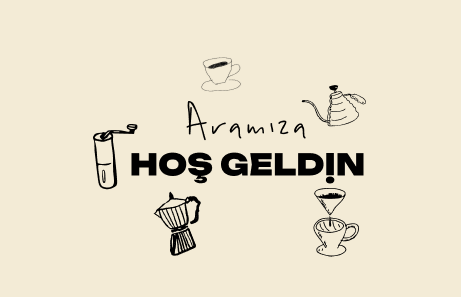Dear readers, in this article, we will touch on a subject that greatly affects the quality of our health, especially when consumed regularly. For the past decade, organic foods have been on the front shelves of both supermarkets and health trends. But do we really need to consider this when it comes to coffee? Isn't traditional coffee as good as organic coffee? Let's examine it together.
What is Organic Coffee?
Coffee can be considered organic when grown without the use of chemical-based fertilizers, synthetic fertilizers, pesticides, or genetically modified organisms (GMOs).
There is a saying, "You are what you eat, so don't be quick, cheap, easy or fake". This phrase makes even more sense when it comes to your coffee.
If you don't want to drink a cup of coffee that has been exposed to pesticides, herbicides, fungicides and harmful fertilizers, organic coffee guarantees the healthiest coffee experience and is better for our nature.
Some might argue that the organic market is just a fad and that food and beverages must maintain a certain level of quality in order to be sold worldwide, so the organic label is a kind of scam. On the other hand, it can be said that the food and beverage regulations are not created equally all over the world and therefore the need for organic products and products has become concrete as a whole.
In any case, we think it's better to be safe than to take risks. You wouldn't drink a glass of water if you knew your drinking water was exposed to pesticides, so why risk your coffee?
Is Organic Coffee Healthier?
With more than 200 pesticides used in conventionally grown coffee products, conventional coffee is one of the most heavily chemically treated of any agricultural product in the world.
Because coffee beans are exposed to direct sunlight throughout the day, the immune systems of coffee plants weaken and sunlight makes plants more susceptible to insects and pests.
As a solution, farmers have to spray large quantities of pesticides directly on the coffee beans, which inevitably affects the beverages people drink every day. In the process, you can see that this is not only harmful to our health, but also to the farmers who grow coffee.
In traditional coffee production, there are two groups affected by the agricultural process. The first group is people who collect and process coffee fruits during the farming and processing stages. The second group is you, the consumers. In short, traditional coffee farming can cause short- and long-term health problems for us as coffee growers and consumers alike.
What are the Differences Between Organic and Traditional Coffee?
As you can see from the information we mentioned above, non-organic coffee is not very healthy for those who drink it, grow it, or even live near the places where traditional coffee is grown. But let's dive a little further into the farming process of both organic and traditional coffee. The biggest difference is actually in the parts of the process that we don't see. Namely, agricultural processes.
When it comes to organic farming, the farmer's main focus is to make decisions at all steps of the process to support the health of both the environment and the consumer.
An organic farmer starts with a natural fertilizer. This is usually something that comes from coffee pulp or cattle manure.
While an organic farmer may not have to deal with as many insects or pests as a conventional farmer at the beginning of the process, he or she will have a similar weed issue to deal with. For this, the organic farmer will use natural methods for the care of weeds. This can burn the weeds with a natural gas flamethrower, use the animals to eat the weeds, or even use a little elbow grease to manually remove the weeds.
A traditional farmer smokes the soil to eliminate naturally occurring fungi. The next step is to fertilize the soil with a heavy petroleum-based chemical fertilizer. The coffee seeds are then soaked in insecticides and fungicides before being planted. After the seeds are planted, another chemical is added to the irrigation water to keep the pests away. After coffee plants begin to sprout, a traditional farmer sprays them with weed pesticides to kill unwanted weeds.
By comparing these farming processes side-by-side, it's hard to deny the huge difference in the way these coffee crops are grown. Not only does it have a huge impact on nature, but it can also have irreparable consequences on our body.
What Makes Organic Coffee Better?
When it comes to organic coffee, the fact that cleaner beans also equal cleaner air, water and soil is indisputable. This is because no synthetic fertilizers or chemicals are used in coffee production. While conventional coffee continues to eclipse healthy consumption in the background of pesticide use, organic coffee beans are higher in nutrients and rich in antioxidants. Some people even claim they can tell the difference in taste!
At the end of the day, it's important to know how your coffee was grown. We all want to buy responsibly sourced coffee. Making sure your organic products are genuine by verifying that they are certified organic will guarantee the highest form of organic integrity.
Bibliography: https://www.roastycoffee.com/organic-vs-non-organic-coffee/





